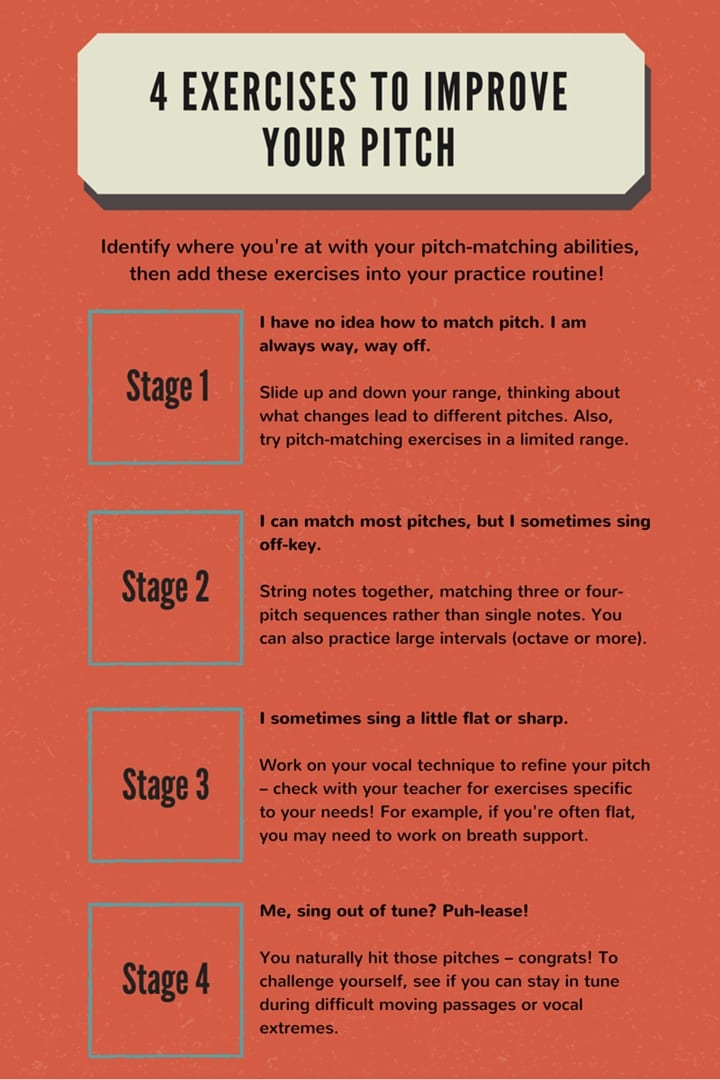Do you think you’re “tone deaf” and destined to be a bad singer for the rest of your life? Think again! Read on as voice teacher Elaina R. dispels the myth behind tone deafness…
Tone deafness is a common misconception that often plagues students and musicians alike. Many people believe that if they can’t carry a tune, they must be tone deaf. But the truth is, most people are not actually tone deaf.
Am I tone deaf? An alarming number of people ask themselves this question. But the truth is, tone deafness is a pretty rare phenomenon. Don’t give yourself up as a lost cause simply because you can’t carry a tune. Instead, learn what tone deafness is – and what common issues could be causing your pitch problems.
This blog post will explore the definition of tone deafness and dispel some of the myths associated with it.
Stay tuned for more information!
What is Tone Deaf Example?
So what is the tone deaf meaning? Here’s a tone deafness definition and a few other things you need to know:
- Definition: tone deaf is the inability of a person to recognize or identify different musical tones and nuances.
- It can be caused by a number of factors: These include disorders of hearing and/or neural processing in the brain.
- Tone deafness can also develop as a result of developmental and psychological factors: These include factors such as anxiety about performing in front of others.
Ultimately, true tone deafness is exceedingly rare. You can usually correct issues with your pitch by taking singing lessons. Get an idea of what you’ll learn by watching the video below:
https://www.youtube.com/watch?v=8CNZon86up0
What Does “Tone Deaf” Mean?
What Does “Tone Deaf” Mean?
For the tone-deaf, hearing the pitch and processing it in the brain is impossible. Tone deaf people cannot distinguish between musical pitches because that is the way their brains work. There is even a medical term for this condition: amusia.
According to scientists, congenital amusia (amusia not caused by brain injury) only affects 4% of people. So if you are having trouble singing in tune, it probably isn’t because you are tone deaf; it’s because you haven’t figured out the complex coordination between the brain, vocal cords, and breath that leads to pitch accuracy. In my years of teaching, I have met many students who have difficulty singing in tune, but not a single one of them was tone deaf!
Are you still asking yourself, Am I tone deaf? Take this free tone deaf test from the National Institute on Deafness and Other Communication Disorders to find out. Unfortunately there is no known cure for amusia (it’s just the way your brain is), so if you truly are tone deaf, singing probably isn’t the best choice for you. However, you can still enjoy playing a different instrument, such as drums.
So, I’m Not Tone Deaf. Why Can’t I Match Pitch?
So, I’m Not Tone Deaf. Why Can’t I Match Pitch?
Singing a pitch is a complicated coordination between the brain, the vocal cords, and the breath. First, the singer hears the pitch. Then, the singer must adjust their vocal cords so that they are just the right thickness to replicate the pitch. Finally, the singer uses their breath to make their vocal cords vibrate, producing the pitch.
Failure on any one of these three fronts can make a singer sing out of tune. For most people, the second step — getting the vocal cords to just the right position to sing a particular pitch — is the hardest. Even people with perfect pitch sometimes sing out of tune for this very reason!
What is Perfect Pitch?
Perfect pitch, also known as absolute pitch, is a rare and coveted musical ability that allows musicians to identify or produce a given sound without any reference point. This ability can be extremely challenging to acquire, but those who have it are able to recognize sounds with an uncanny accuracy.
Whether they are listening to a piece of music, identifying notes on a scale, or even singing themselves, musicians with perfect pitch are able to accurately name specific tones without having them referenced in any way.
While this talent is certainly impressive, it is by no means necessary for a successful musical career – many highly accomplished musicians do not possess absolute pitch at all. Ultimately, what matters most in music is not perfect pitch or even great technique; rather, it is the passion and creativity that drives musicians to succeed.
The Many Faces of Pitch Problems
I think of pitch-matching ability in stages. Some people start off at Stage 1, while others naturally start at Stage 4. Wherever you start, with the right kind of practice, you can progress through the stages until you make it to Stage 4.
Stage 1: Usher
I have no idea how to match pitch. I am always way, way off.
With students like this, I usually start with simple free vocalization, having the student slide up and down their range and think about how they are making the changes that lead to the pitch going up or down. Then, I introduce pitch-matching exercises in a limited range, using an app like Pitch Analyzer to gauge accuracy. The more you practice matching pitch, the faster you will get better, so aim for five to 10 minutes per day.
Stage 2: Stagehand
I can match most pitches, but I sometimes sing off-key.
Singers at Stage 2 still need to practice matching pitch every day. Unlike Stage 1 singers, though, you can start stringing notes together, practicing matching three- or four-pitch sequences rather than single notes. You should also practice large intervals of an octave or more (large intervals tend to be more disorienting).
Stage 3: Background Singer
I sometimes sing a little flat or sharp.
Stage 3 singers have usually mastered the coordination between the brain and the vocal cords. For these singers, the problem is vocal technique. A singer who is often flat, for instance, may need to bolster their breath support or raise their facial resonators more. A singer who is often sharp may be using too much energy or air to fuel their sound.
Stage 4: Diva
Me, sing out of tune? Puh-lease!
Whether by nature or nurture, Stage 4 singers are deadly accurate. Their brain, vocal cords, and singing technique work in tandem to produce spot-on pitches. The challenge for Stage 4 singers is to stay in tune during difficult moving passages or vocal extremes.
Here’s a recap:
What Percentage of the World is Tone Deaf?
Many people believe that they are tone deaf, when in reality, they are not. Tone deafness, or amusia, is a rare condition that affects about 4% of the population.
People with amusia cannot process music in the same way as those without the condition. They may have difficulty discerning pitch, rhythm, and melody.
As a result, they may find it hard to sing or play an instrument in tune.
How to Know if You’re Tone Deaf
There are a few ways to test for amusia. A tone deafness test can give you an idea of whether you have true tone deafness or if you’re just a little pitchy.
One tone deafness test you can try is to identify two notes that are played one after the other. If you can’t tell the difference between the two notes, you may be tone deaf.
Another way to test for amusia is to try to sing along with a familiar song. If you find yourself consistently off-key, or if you have trouble following the melody, you may be tone deaf.
While there is no cure for amusia, people with the condition can learn to identify tones and improve their pitch recognition with training and practice.
Am I Tone Deaf? No!
Although it’s a common misconception, most people are not actually tone deaf. With a few simple tips, you can learn to better understand the nuances of tone.
If you are not one of the 4% of people who is truly tone deaf, you can learn to sing accurately. I have never had a student whose pitch accuracy has not improved with time. Just find a good singing instructor, practice every day, and slowly but surely, you will learn to sing in tune.
 Post Author: Elaina R.
Post Author: Elaina R.Elaina R. teaches opera voice and singing in Ann Arbor, MI, as well as through online lessons. She is currently working on a Master of Music at the University of Michigan, and she has a B.M. from the University of Southern California. Learn more about Elaina here!
Suzy S.



